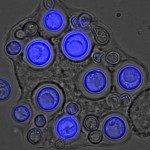Lien vers Pubmed [PMID] – 20718612
Med. Mycol. 2011 Apr;49 Suppl 1:S48-53
The PCR methods published for the diagnosis of invasive aspergillosis (IA) are diverse in terms of amplification protocols and methods, equipment, fluorescent detection dyes, PCR chemistries, and clinical specimens used. This explains why PCR is still not included in the revised EORTC/MSG definitions of IA despite encouraging results. Therefore, achieving consensual PCR procedures at the international level is mandatory. When using PCR as a diagnostic tool, emphasis must be put on limiting false positive results due to contamination either with previously amplified products or with environmental commensals. Internal amplification controls are compulsory to evidence false negative results. For most of these aspects, quantitative PCR (qPCR) should improve both the results’ reliability and the clinicians’ confidence. A checklist of items (Minimum information for publication of quantitative real-time PCR experiments) has been proposed to help scientists and reviewers. Currently, the main limitation relies in the DNA extraction procedure the choice of which dramatically depends on the still unknown origin of the Aspergillus DNA to amplify. There is an urgent need for basic studies to elucidate the origin and kinetics of Aspergillus DNA in blood. Once a technical consensus is achieved, clinical studies should be initiated to integrate qPCR in the diagnostic armentarium of IA.

